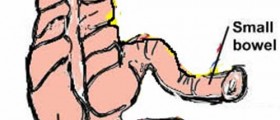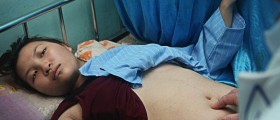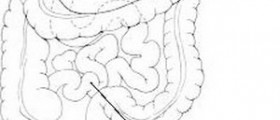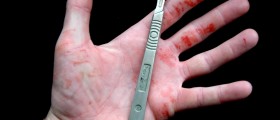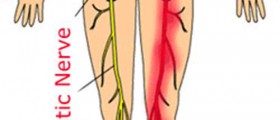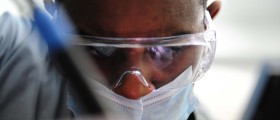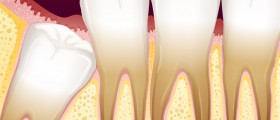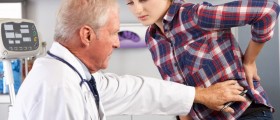UPDATE: My appendectomy surgeon was able to conclude through physical examination, discussion of pain symptoms and an injection of a nerve blocker (Xylocaine: lidocaine HCI and epinephrine) into the Ilioinguinal Nerve at my left hip that my pain is in fact nerve pain. The Ilioinguinal Nerve runs along/into the Rectus Abdominis Muscle, which in my case, was involved in the procedure to extract the appendix. After 20 mins, the nerve blocker had begun to take effect. I was then assisted in carefully re-creating a movement that would normally trigger the pain. The result was diminished pain. He did say this isn't normal (it's rare), that he hasn't encountered this with a patient previously, and that one should normally be healed by 15 days post-op (I'm currently at the 12th day). He referred me to a nerve specialist and prescribed Rx to "manage pain" in the meantime (ibuprofen and gabapentin; but not both taken together, or in combination with other drugs), which is apparently all that can be done until the nerve fully heals in approximately 2 months. During the upcoming two month period I should see incremental improvement, and should not aggravate the nerve with any of the abdominal positioning/activities that trigger the pain. As a side note, he did advise to seriously avoid extended/frequent use of ibuprofen, naproxen sodium, acetaminophen, etc., and that severe liver damage and stomach ulcers are a serious risk. So I plan to cut back on meds, keep to being a still as possible, and rely on any improvement during the upcoming healing period to get me through extended periods without meds. Hope you find this helpful to understanding your pain and finding some comfort. I found the description of the Ilioinguinal Nerve on Wikipedia to be very informative, which mapped exactly to the areas of pain I am experiencing.
Loading...
However, I decided to travel anyway more so because I had spent countless hours and thousands of dollars toward the trip, and because there was still a little less than a week before I'd actually step foot on the trail. My thought was that I may as well attempt recovery at the location on the chance I was somehow able to re-join the trail a week or two in.
The next day I was wheeled to and from the plane in a wheelchair because the pain was too intense to walk it on my own.
Over the next five days (at my destination) I continuously experienced the moments of intense pain I had been encountering. However, I noticed the more times I had the pains, the smaller the intensity was becoming. In fact, over each of those five days my pain level diminished by half of what it had been the day before.
I do not know if my seemingly sudden and accelerated recovery came about due to the many demands of travel (a 5 hour flight, boarding buses, getting in and out of a car, attempting to lift luggage, etc.), but the much increased exertion, different kinds of body movements and activities (other than simply remaining as still as possible at home) that always triggered the painful episodes do coincide exactly.
I can't help wondering if it's possible scar tissue was attaching itself to the nerve, and each painful episode was the nerve and the scar tissue pulling apart. The pain was incredibly intense, causing me to not want to move even a little for fear of experiencing it. But my reality was the more I experienced this horrible, horrible pain the more quickly it was diminished.
On the fifth day, I still experienced moments of moderate to strong pain but it was completely manageable, and my mobility was nearly normal. Within a week of that I was climbing mountain passes, twenty-plus miles into my backpacking trip with a 40-pound pack on my back—and the only time I thought of the pain again was when I was marveling at how fast I'd suddenly recovered.
One last note. The tissue beneath my primary incision became a large, hard lump in the first weeks after surgery, but after a couple of months it's become nearly undetectable.
I hope learning of my experience helps you to make sense of your own pain, and to be hopefully to be encouraged.
Loading...
Loading...
I had terrible stomach pain for 5 weeks after surgery. Getting out of bed, standing up from a toilet or a couch, sneezing, and coughing all felt like a sharp stabbing pain on my left side incision. Today, I prayed and ask to be healed. Then I did very slow squats to a low seated position next to my desk at work. I could only this 4 or 5 times because of the pain. I repeated this multiple times during the morning. The pain started to lessen. I have had very little pain now for 7 hours. I think this stretched the wound and freed up the nerves. Hope this helps you!
Loading...
Loading...
You may want to try some at-home measures to help manage your symptoms, such as practicing pelvic floor exercises to improve bladder control, taking over-the-counter pain relievers like acetaminophen or ibuprofen (if recommended by your healthcare provider), and avoiding activities that exacerbate your symptoms, such as heavy lifting or strenuous exercise.
It may also be helpful to keep a journal of your symptoms, including when they occur, their severity, and any other factors that may be contributing to them, such as diet or stress. This information can be helpful to share with your healthcare provider and may aid in your diagnosis and treatment.
Overall, it's important to advocate for yourself and seek prompt medical attention if you are experiencing concerning symptoms. If you are unable to get an appointment with your GI doctor, you may want to consider seeking care from an urgent care clinic or emergency room if your symptoms are severe or worsening.
Loading...



